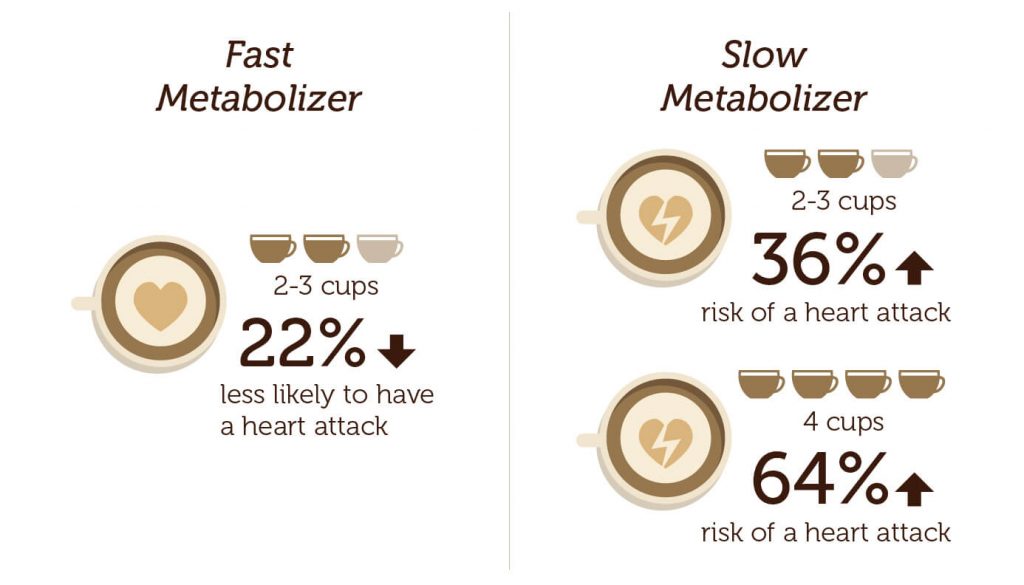DNA Caffeine Sensitivity Test
Discover your body’s response to caffeine
Wondering if your caffeine consumption could be affecting your health? Find out how your body processes caffeine with the DNA Caffeine Sensitivity Test.
- Learn whether you carry specific genetic variants that influence how you metabolize caffeine.
- If you’re a “slow” metabolizer, you might have an elevated risk of heart attack and hypertension.
- Collect your sample at home with easy-to-use mouth swabs
What is caffeine?
Caffeine is a natural stimulant most commonly found in coffee, tea, and energy drinks. It’s recognized as the world’s most consumed psychoactive drug. Unlike many other psychoactive substances, caffeine is legal, unregulated, and easily accessible to the public.
How does caffeine affect your body?
When you consume caffeine, it acts on the central nervous system, enhancing alertness and diminishing the sensation of tiredness.
Here’s how it functions within the body:
- Caffeine attaches to nerve cell receptors, increasing their activity.
- It triggers the release of hormones and produces adrenaline, boosting alertness and energy.
- It raises dopamine levels in the brain, which can lead to feelings of pleasure and possibly dependence.
What are the side effects of caffeine consumption?
In developed nations, over 90% of adults consume caffeine on a regular basis. While small to moderate amounts are generally safe, consuming it excessively can lead to side effects like insomnia, headaches, irritability, and anxiety. Over time, habitual users may build a tolerance, necessitating higher doses to achieve the same alertness and energy.
CYP1A2: Your Caffeine Processing Enzyme
Caffeine, commonly found in drinks and foods, is mainly processed by an enzyme called CYP1A2. This enzyme deals with about 95% of our caffeine intake.
Your CYP1A2 gene affects how you handle caffeine:
- Fast Metabolizers: These people naturally produce more of the enzyme, so they break down caffeine quickly.
- Slow Metabolizers: These individuals make less enzyme. They process caffeine more slowly, which can linger in their system and increase their risk of heart issues.
Being aware of how you metabolize caffeine is crucial. For those who process it slowly, cutting back on caffeine can help lower heart health risks. Heart disease remains a top global health concern, and adjusting caffeine consumption can be one preventive step.

How are CYP1A2 alleles inherited?
CYP1A2 is found on chromosome 15. Each person inherits two copies of this gene—one from each parent. This means you can inherit:
- Two of the same alleles, making you either a homozygous “fast” or a homozygous “slow” metabolizer.
- One of each allele, making you heterozygous.
Notably, those with at least one “slow” allele metabolize caffeine more slowly.
DNA Testing for CYP1A2
The key difference between the “fast” and “slow” alleles lies at position -163 in the gene’s regulatory region, which affects enzyme production. Here’s what the designations mean:
- -163 AA: This denotes a “fast” caffeine metabolizer. For such individuals, coffee doesn’t elevate the heart attack risk any more than usual. All children of this person will inherit the “fast” allele.
- -163 AC: This indicates a slower caffeine metabolism, and there’s a heightened risk of heart attacks from coffee. Any child of this individual has an equal chance of inheriting either the “slow” or the “fast” allele.
- -163 CC: This signals a slow caffeine metabolism. Consuming coffee has a pronounced risk of heart attacks for these people. Every child of this individual will inherit the “slow” allele.
HOW IT WORKS
 ORDER TEST
ORDER TEST
From paternity tests to grandparent tests, we offer a wide range of DNA tests to fit your needs.

COLLECT SAMPLE
Easily swab the participants with our painless mouth swabs, then send the samples to our laboratory for analysis.

RECEIVE RESULTS
Access your confidential results online within 7-14 business days. Our team of experts is available for any questions.


